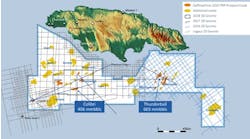Offshore staff
WASHINGTON, D.C.– US Secretary of the Interior Sally Jewell and Bureau of Ocean Energy Management (BOEM) Director Abigail Hopper have released the proposed final 2017-2022 outer continental shelf oil and gas leasing program.
It offers 11 potential lease sales in four planning areas – 10 sales in the portions of three Gulf of Mexico program areas that are not under moratorium and one sale off the coast ofAlaska in the Cook Inlet program area. However, the Beaufort and Chukchi seas planning areas in the Arctic as well as the Pacific and Atlantic OCS are not included in the program.
Secretary Jewell said: “The plan focuses lease sales in the best places – those with the highest resource potential, lowest conflict, and established infrastructure – and removes regions that are simply not right to lease. Given the unique and challenging Arctic environment and industry’s declining interest in the area, forgoing lease sales in the Arctic is the right path forward.”
The secretary may approve the final program after a minimum of 60 days; the plan would then become effective on July 1, 2017.
BOEM Director Hopper added: “The plan was informed by robust stakeholder engagement and the best available science. The proposal makes available more than 70% of the economically recoverable resources, which is ample opportunity for oil and gas development to meet the nation’s energy needs.”
Many industry associations have issued responses to the proposed final program.
Independent Petroleum Association of America President and CEO Barry Russell said: “The administration should allow more access to our vast energy resources, not less. It’s disappointing that this administration, with just two months left in office, has chosen to take the low, politically-motivated path and dictate the nation’s offshore program for the entirety ofPresident-elect Trump’s four-year term.”
National Ocean Industries Association President Randall Luthi said: “The eye-rolling decision to eliminate lease sales in the Beaufort and Chukchi seas from the final 2017-2022 OCS oil and gas leasing program is a short-sighted political decision that threatens US energy security, pulls the rug out from under Alaskans, and is a slap in the face and for consumers in the US and throughout the world. The arrogance of the decision is unfathomable, but unfortunately not surprising. Once again, we see the attitude that Washington knows best; an attitude that contributed to last week’s election results.
“Following the same political calculus that resulted in theremoval of Atlantic Lease Sale 260 from the proposed program in March, the administration has chosen a politically expedient agenda that bows to the wishes of anti-fossil fuel activists and has completely discounted the opinion of the people with the most at stake. More than 70% of Alaskans, including a majority of Alaska Natives, support offshore development in their state. Considering that the oil and gas industry generated 38% of all income in Alaska in 2013 and provided about 90% of the Alaska state government’s general revenue in 2015, Alaskans have everything to lose with today’s decision.
“The impact of limiting offshore access does not stop at Alaska’s border. Some estimates predict that oil and gas development offshore Alaska could generate $193 billion in federal revenue over 50 years and support nearly 55,000 jobs nationwide. And that’s just the economic impact of the decision. Many of President Obama’s own advisors have argued thatArctic energy development is imperative to our national security. Offshore oil and gas development will be instrumental in developing infrastructure projects that will strengthen the US presence in the region.
“While countries such asNorway, Russia, and even China are ramping up their presence in the Arctic, the US will have to play catch up. Finalizing the 2017-2022 OCS leasing program without including the Beaufort and Chukchi seas means the race has started and the US is not even on the track.”
Consumer Energy Alliance President David Holt added: “This decision threatens to undermine and reverse historic economic, societal, and environmental gains we’ve made thanks to the US energy revolution. The administration has failed to present a serious offshore leasing plan that will help meet our nation’s long-term energy needs by caving to the demands of anti-development extremists and further restricting offshore leasing through 2022.
“Today’s action, which contradicts the broad support that exists for offshore development in communities throughout Alaska and the nation at large, underscores the need for more common-sense decisions. The next administration will soon have an opportunity to change course by taking a much more responsible approach. The economic well-being and quality of life of the American people and businesses, especially those in Alaska, depend on it.”
11/18/2016


